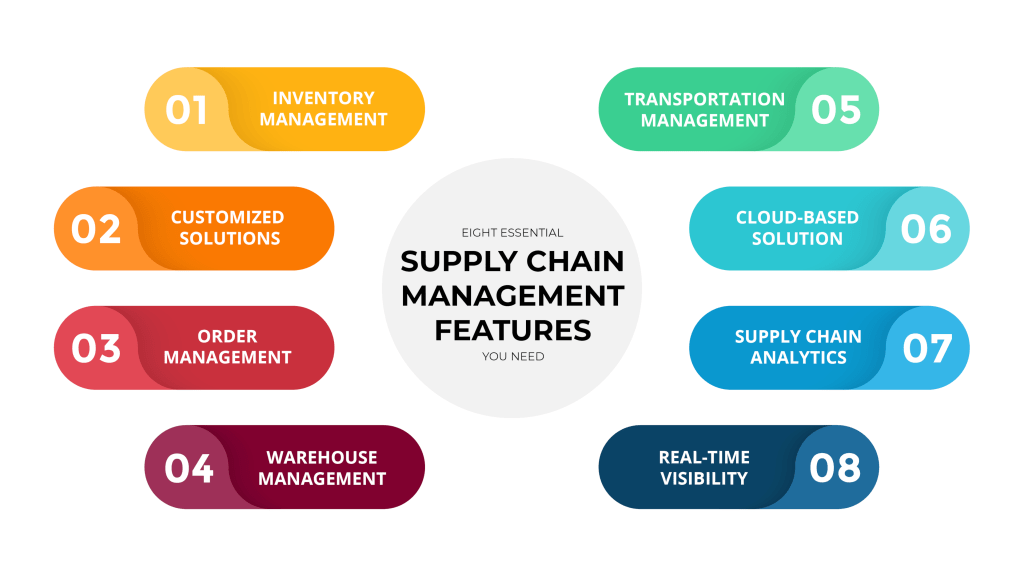Supply Chain Management Software features include inventory management, order processing, and real-time data analytics. It also offers supplier coordination and demand forecasting.
Efficient supply chain management is crucial for businesses to thrive in today’s competitive market. Supply Chain Management Software (SCMS) provides tools to streamline operations, reduce costs, and improve overall efficiency. Key features like inventory management help track stock levels accurately.
Order processing automates and speeds up the fulfillment process. Real-time data analytics offers insights into performance metrics and potential bottlenecks. Supplier coordination ensures seamless communication and collaboration. Demand forecasting enables better planning and resource allocation. With these capabilities, SCMS helps businesses stay agile and responsive to market demands, ultimately driving growth and profitability.

Credit: www.selecthub.com
Introduction To Supply Chain Management
Supply Chain Management (SCM) is the backbone of any business. It oversees the flow of goods and services. SCM includes processes that transform raw materials into final products. Effective SCM ensures timely delivery and cost efficiency. It enhances customer satisfaction and business profitability.
Importance Of Scm
SCM is crucial for businesses today. It helps reduce operational costs. Efficient SCM leads to faster production cycles. It ensures the right products reach the right places on time. SCM also improves supplier relationships. This builds a strong network of reliable partners.
Here are some key benefits of SCM:
- Cost Reduction: Minimizes waste and reduces costs.
- Improved Efficiency: Streamlines operations for faster delivery.
- Better Customer Service: Ensures timely and accurate delivery.
- Risk Mitigation: Identifies and manages potential risks.
Modern Challenges
Modern SCM faces many challenges. Globalization has increased supply chain complexity. Companies need to manage multiple suppliers and markets. Technology plays a crucial role in addressing these challenges. But, keeping up with technological advancements is tough.
Some modern challenges include:
- Supply Chain Visibility: Tracking products across global networks is difficult.
- Data Management: Handling large volumes of data is a challenge.
- Cybersecurity Threats: Protecting data from breaches is vital.
- Sustainability: Ensuring eco-friendly practices is essential.
Supply Chain Management Software helps address these challenges. It offers features like real-time tracking, data analytics, and risk management. These tools ensure smooth and efficient supply chain operations.

Credit: www.futurismtechnologies.com
Core Features Of Scm Software
Supply Chain Management (SCM) software has many core features. These features help businesses streamline operations. Two vital aspects are Inventory Management and Order Processing. Both play crucial roles in the supply chain.
Inventory Management
Inventory management is a key feature in SCM software. It helps businesses track stock levels. This ensures products are available when needed. Effective inventory management can reduce costs and increase efficiency.
- Real-time Tracking: Monitor stock levels in real-time.
- Automated Replenishment: Automatically reorder products when stock is low.
- Demand Forecasting: Predict future inventory needs based on data.
- Warehouse Management: Optimize storage space and workflows.
Order Processing
Order processing is another crucial feature. It manages the flow of orders from start to finish. This ensures orders are fulfilled accurately and on time.
- Order Entry: Capture order details quickly and accurately.
- Order Tracking: Track the status of orders throughout the process.
- Shipping Management: Manage shipping logistics and track deliveries.
- Returns Management: Handle product returns efficiently.
SCM software integrates these features seamlessly. This integration helps businesses run smoothly and serve customers better.
Advanced Analytics And Reporting
Supply Chain Management Software must have advanced analytics and reporting features. These features help businesses make better decisions. They provide deep insights into supply chain operations.
Real-time Data Insights
With real-time data insights, businesses see live updates on their supply chain. This feature helps identify problems quickly. Live updates ensure immediate action on any issue.
Real-time data insights offer:
- Live tracking of shipments
- Instant inventory updates
- Quick response to demand changes
A table can also show real-time data clearly:
| Metric | Real-Time Value |
|---|---|
| Current Stock Level | 500 units |
| Shipment Status | On route |
| Order Processing Time | 2 hours |
Predictive Analytics
Predictive analytics use historical data to forecast future trends. This helps businesses prepare for future demand. Predictive analytics reduce risks and improve planning.
Key benefits of predictive analytics include:
- Accurate demand forecasting
- Optimized inventory levels
- Reduced stockouts and overstock
Predictive analytics also help in:
- Identifying seasonal trends
- Improving supplier management
- Enhancing customer satisfaction
Both real-time data insights and predictive analytics are essential. They ensure supply chain efficiency and effectiveness.
Automation And Workflow Optimization
Supply chain management software has revolutionized logistics. Automation and workflow optimization are key features. These tools save time and reduce errors. They also help in managing resources efficiently. Let’s explore the benefits of automated processes and workflow integration.
Automated Processes
Automated processes streamline supply chain tasks. This includes order processing, inventory management, and shipment tracking. Automation reduces manual errors and boosts efficiency. Businesses can focus on strategic activities. It also enhances customer satisfaction.
- Order Processing: Automate order entries and updates.
- Inventory Management: Keep track of stock levels automatically.
- Shipment Tracking: Monitor shipments in real-time.
Workflow Integration
Workflow integration connects all supply chain activities. It ensures smooth coordination between different departments. Integrated workflows improve communication and data sharing. This leads to faster decision-making and problem-solving.
Here are some key benefits of workflow integration:
| Feature | Benefit |
|---|---|
| Cross-department Collaboration | Better teamwork and efficiency |
| Real-time Data Sharing | Faster, informed decisions |
| Centralized System | Reduces redundant processes |
Effective workflow integration maximizes resource utilization. It also minimizes operational costs. This leads to a more responsive and agile supply chain.
Supplier And Vendor Management
Effective Supply Chain Management Software includes robust features for Supplier and Vendor Management. These features help businesses streamline relationships with suppliers and vendors. Let’s dive into key aspects like Supplier Collaboration and Vendor Performance.
Supplier Collaboration
Supplier collaboration tools facilitate seamless communication. They enable real-time updates and shared documents. These tools ensure everyone stays informed.
- Real-Time Updates: Stay updated with instant notifications.
- Shared Documents: Access and share important files securely.
- Collaborative Planning: Plan projects together with your suppliers.
Collaboration tools also offer a centralized platform. This platform makes it easy to track and manage supplier interactions. It ensures transparency and improves efficiency.
Vendor Performance
Monitoring vendor performance is crucial for maintaining high standards. Performance metrics help in evaluating vendor reliability and quality.
| Metric | Description |
|---|---|
| On-Time Delivery | Measures if deliveries meet schedule. |
| Quality Score | Assesses the quality of supplied goods. |
| Compliance Rate | Checks adherence to agreed terms. |
Regular vendor reviews ensure consistent performance. They help identify areas for improvement and maintain strong vendor relationships.

Credit: www3.technologyevaluation.com
Customer Relationship Management
The Customer Relationship Management (CRM) feature in Supply Chain Management Software is vital. It helps businesses build and maintain strong relationships with their customers. CRM tools streamline communication, improve customer satisfaction, and increase sales efficiency.
Customer Support
Effective customer support is crucial in supply chain management. CRM systems provide tools to track and manage customer inquiries. This ensures timely responses and resolutions. Key features include:
- 24/7 support availability
- Automated response systems
- Live chat integration
- Comprehensive ticketing systems
These features enable support teams to handle customer issues promptly. Happy customers are loyal customers.
Order Tracking
Order tracking is essential for customer satisfaction. CRM systems in supply chain management offer robust order tracking features. Customers can track their orders in real-time. This transparency builds trust and reliability.
Key functionalities include:
| Feature | Benefit |
|---|---|
| Real-time Updates | Customers know their order status at all times. |
| Automated Notifications | Customers receive timely updates via email or SMS. |
| Delivery Tracking | Customers can track the delivery route and ETA. |
These features enhance the customer experience. They reduce anxiety and improve satisfaction.
Security And Compliance
Security and compliance are crucial aspects of supply chain management software. Companies need to ensure their data is safe and they follow all regulations. These features help protect sensitive information and avoid legal issues.
Data Protection
Data protection is essential for any supply chain management software. Companies handle sensitive information daily. This includes customer data, financial records, and product details. Protecting this data is vital to maintain trust and avoid breaches.
Encryption is one key feature. It ensures that data is unreadable to unauthorized users. Another important feature is multi-factor authentication (MFA). This adds an extra layer of security. Users must provide two or more verification factors to access the system.
Here is a table that highlights important data protection features:
| Feature | Description |
|---|---|
| Encryption | Scrambles data to protect it from unauthorized access. |
| Multi-Factor Authentication (MFA) | Requires multiple forms of verification for access. |
| Access Controls | Limits who can view and edit sensitive information. |
| Data Backup | Regularly saves copies of data to prevent loss. |
Regulatory Compliance
Regulatory compliance ensures that companies follow laws and guidelines. This is important to avoid legal penalties and maintain operations. Supply chain management software must support compliance with various regulations.
One key regulation is the General Data Protection Regulation (GDPR). Companies that handle EU citizen data must follow GDPR rules. Another important regulation is the Health Insurance Portability and Accountability Act (HIPAA). This applies to companies handling health information.
Here are some features that support regulatory compliance:
- Audit Trails – Keeps a record of all system activities.
- Compliance Reporting – Generates reports to show compliance status.
- Data Anonymization – Removes personal identifiers from data.
Using these features helps companies stay compliant and avoid fines.
Scalability And Customization
Supply chain management software must be scalable and customizable. Businesses grow and change, and so should their tools. Scalability allows the software to grow with your business. Customization ensures the software meets your unique needs.
Adaptable Solutions
Adaptable solutions mean the software can handle different sizes of data. Whether you have a small or large amount of data, the software works smoothly. This helps in managing resources better and saves time.
- Handles small and large data
- Saves time
- Manages resources better
The software can also adjust to different workflows. This means it can fit into how your business operates. This flexibility is crucial for maintaining efficiency.
| Feature | Benefit |
|---|---|
| Data Handling | Works with small and large data |
| Workflow Adjustment | Fits into business operations |
Custom Features
Custom features let you tailor the software to your needs. You can add or remove features as needed. This makes the software more effective for your business.
You can also change how the software looks and works. This helps in making the software easy to use. You can set preferences that suit your business style.
- Tailor features to needs
- Add or remove features
- Change appearance and functionality
Custom features make the software user-friendly. This increases productivity and satisfaction among employees.
Future Trends In Scm Software
The future of Supply Chain Management (SCM) software is bright. New technologies are changing how we manage supply chains. Let’s explore some key trends.
Ai And Machine Learning
Artificial Intelligence (AI) and Machine Learning (ML) are revolutionizing SCM. These technologies help in predicting demand, optimizing routes, and managing inventory. Here are some benefits:
- Accurate Demand Forecasting: AI predicts future demand with high accuracy.
- Route Optimization: ML finds the best routes for deliveries.
- Inventory Management: AI helps in maintaining optimal inventory levels.
These features improve efficiency and reduce costs.
Blockchain Integration
Blockchain technology ensures transparency and security. It records transactions in a way that cannot be altered. Some key benefits include:
- Traceability: Track products from origin to destination.
- Security: Ensure data integrity and security.
- Transparency: All parties can see the transaction history.
These benefits build trust among all parties involved.
Choosing The Right Scm Software
Choosing the right Supply Chain Management (SCM) software can feel overwhelming. With many options, it’s important to find the best fit for your business needs. This section will guide you through key considerations and implementation tips to make an informed decision.
Key Considerations
When selecting an SCM software, several factors come into play. Here are some key considerations:
- Scalability: Ensure the software can grow with your business.
- Integration: Check if it integrates with existing systems.
- Usability: Look for user-friendly interfaces and easy navigation.
- Customization: The software should meet your unique needs.
- Cost: Consider both upfront costs and ongoing expenses.
- Support: Ensure there is reliable customer support available.
Implementation Tips
Implementing SCM software requires careful planning. Here are some tips:
- Define Goals: Clearly outline what you want to achieve.
- Gather Data: Collect all necessary data for seamless integration.
- Train Employees: Provide training to ensure effective use.
- Test System: Run tests to identify and fix issues early.
- Monitor Progress: Regularly check performance and make adjustments.
Following these tips can help ensure a smooth implementation process.
Frequently Asked Questions
What Are The Features Of Supply Chain Management System Software?
Supply chain management software offers inventory tracking, demand forecasting, order processing, supplier management, and logistics optimization. It enhances efficiency, reduces costs, and improves customer satisfaction. Real-time data and analytics enable better decision-making and streamlined operations.
What Are The Essential Features Of Supply Chain Management?
Supply chain management features include demand forecasting, inventory management, logistics coordination, supplier relationship management, and performance monitoring. These elements ensure efficient operations, cost reduction, and customer satisfaction.
What Are The Four Major Types Of Scm Software?
The four major types of SCM software are Supply Chain Planning, Supply Chain Execution, Supply Chain Visibility, and Supply Chain Analytics. These tools help manage and optimize supply chain processes, ensuring efficient and effective operations.
What Are The Components Of Software Supply Chain?
The components of a software supply chain include source code, libraries, build tools, package managers, and deployment pipelines.
Conclusion
Choosing the right supply chain management software enhances efficiency and reduces costs. Prioritize features that match your business needs. Stay competitive with real-time tracking, automated processes, and robust analytics. A well-integrated system can streamline operations, driving growth and profitability. Invest in technology that supports your long-term goals.






